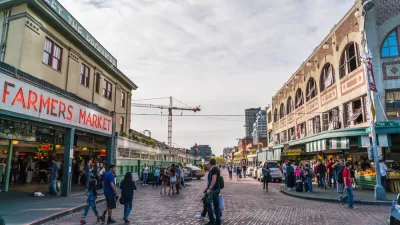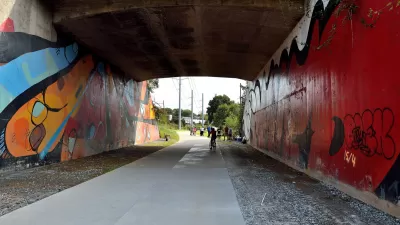It isn't exactly a surprising correlation: gentrification and decreases in crime. This research finds that falling crime often precedes gentrification, not the other way around.

Throughout last year's election, too often the only references to planning dealt with (often erroneous) statements about an urban crime crisis. Sad! Presidential rhetoric aside, it's a fact that, nationally, "violent crime peaked in 1991. It fell precipitously for the next decade, then more slowly through the 2000s [...] While homicides have increased recently in some cities, rates remain far below what they were 25 years ago, including in Chicago."
Emily Badger covers research suggesting an unsurprising link between gentrification and falling crime. "The new research looked at confidential geocoded data from the 1990 and 2000 censuses, and more recent American Community Surveys, to identify the neighborhoods where more than four million households moved."
Influxes of higher earners occurred after crime dropped, not before. "Because this research looked at moves that occurred after crime was already falling, the authors believe the movers were reacting to changes in crime and not simply causing it themselves."
One aspect of this could be that neighborhoods were already depopulated, limiting displacement. "Many of the urban neighborhoods studied had lost population, so they had room to grow again without pushing existing residents out." Of course, higher rents citywide still have consequences for equity.
FULL STORY: How to Predict Gentrification: Look for Falling Crime

Planetizen Federal Action Tracker
A weekly monitor of how Trump’s orders and actions are impacting planners and planning in America.

Chicago’s Ghost Rails
Just beneath the surface of the modern city lie the remnants of its expansive early 20th-century streetcar system.

San Antonio and Austin are Fusing Into one Massive Megaregion
The region spanning the two central Texas cities is growing fast, posing challenges for local infrastructure and water supplies.

Since Zion's Shuttles Went Electric “The Smog is Gone”
Visitors to Zion National Park can enjoy the canyon via the nation’s first fully electric park shuttle system.

Trump Distributing DOT Safety Funds at 1/10 Rate of Biden
Funds for Safe Streets and other transportation safety and equity programs are being held up by administrative reviews and conflicts with the Trump administration’s priorities.

German Cities Subsidize Taxis for Women Amid Wave of Violence
Free or low-cost taxi rides can help women navigate cities more safely, but critics say the programs don't address the root causes of violence against women.
Urban Design for Planners 1: Software Tools
This six-course series explores essential urban design concepts using open source software and equips planners with the tools they need to participate fully in the urban design process.
Planning for Universal Design
Learn the tools for implementing Universal Design in planning regulations.
planning NEXT
Appalachian Highlands Housing Partners
Mpact (founded as Rail~Volution)
City of Camden Redevelopment Agency
City of Astoria
City of Portland
City of Laramie





























